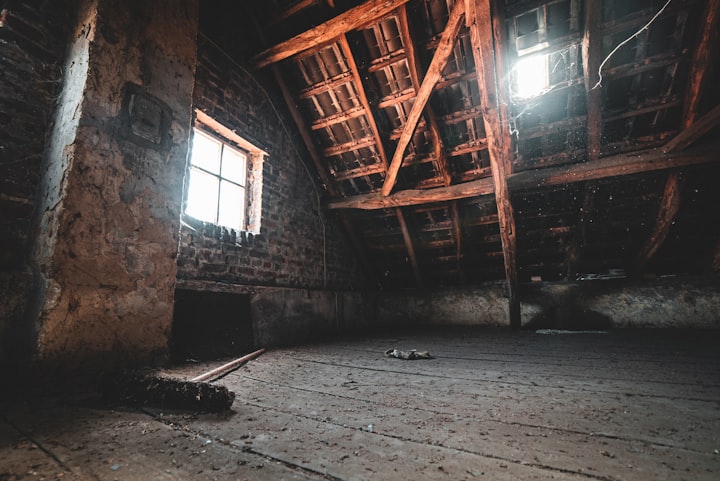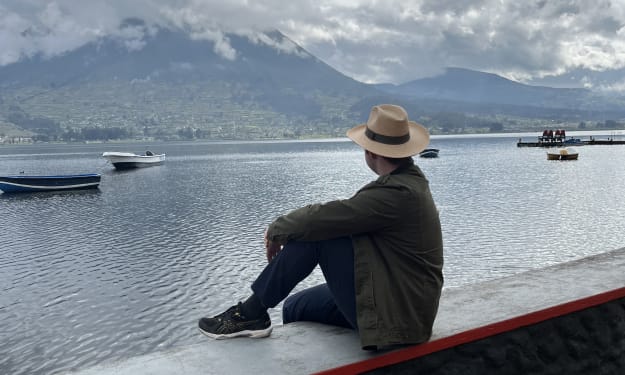Saving Dad
There are worse things than being trapped home alone.

The old dumbwaiter rattled toward the basement, but Paul's father, Professor Allen Stokely, had strictly forbidden any disturbances. That had been his first command. That also meant that Paul could not bounce his basketball, he could not blare any Boston radio stations (even though he thought reception outside Sudbury was shit-on-a-stick), and above all, he could not—must not—cry.
So, Paul did not cry because his father insisted that nine-year old young men never cried, but his stomach twisted into greasy knots anyway. Not just due to hunger, but because something else—and he didn’t know quite what—had gone horribly, horribly wrong.
The dumbwaiter finally reached the bottom with a sharp click. This was how Gracie May had always sent food down. Perhaps if his father saw the tomato sandwich, the glass of milk and the crumbly cookie, he would finally eat. Paul prayed to Lord God at the Pearly Gates, begging that his father would return from his experiment in the workroom.
Oh, please, please Dad, just say SOMETHING!
It had been three days now. Paul still heard noises from the nameless machine struggling to live down there, throbbing and humming at random intervals. His father must be operating it, but the stupid, stupid device had killed every drop of power in the house. Not even the phones worked anymore. Or, more importantly, the thermostat.
Paul shuffled to the kitchen and found some bread in the cupboard, accompanied by a tooth-torn bag of black-eyed peas and a dead mouse, its neck crushed in a trap.

Was it worth dying for, mouse ? The mouse only stared back with beady dead eyes.
Paul sighed and glumly fixed himself a tomato sandwich. The refrigerator contained mustard, a green jello cake wrapped in cellophane, and some nasty stuff called chutney that their housemaid Gracie had fixed. That was it. All the canned goods were gone, and Paul had reluctantly donated the last cookie to his father. His mother would have gladly shared that cookie too though, before the sickness took her away.
“Take care of your father, Paulie,” she had said toward the end, tubes and catheters burrowing into her, the rhythmic blip of a heart monitor nearly louder than her words. The hospital room had smelled of artificial blood, antiseptic, and…pain. All shades of pain. Her skin was parchment-thin, the blood vessels squiggly blue worms beneath. “He’ll need you, Paulie,” her dry feather-light hand touching his. “Make him proud, baby. Make us both proud.”
Paul shoved the memory away.
Sometimes he dreamt of her in that hospital room, her body draped by a sterile white sheet. In the dream she would sit up though, the sheet sliding away, but it wouldn’t be his mother beneath, but something else, some gaunt thing that reached out and just wanted to give him a squeeze.
He chewed sullenly, gazing at the silent green telephone instead of the boarded windows hiding the snowdrifts outside.
He pulled his jacket tighter, but it didn’t help.
Paul finished the milk and left the dishes in the rack. Gracie May had always cleaned up after them. She had also swept the floors, mopped the bathrooms and made their beds, but that was all before. One lonely week already seemed like unbearable months.
He padded to the study and slouched in mild winter light filtering through the drapes. He could barely see the boards behind the curtains, unlike the ones in the kitchen that stood out in plain view.
Hundreds of books lined the walls in the study, and a ladder accessed the higher shelves. Paul normally obeyed his father without question, including Never climb that ladder, Paul, but yesterday he had spotted several promising new volumes. His father always had something new. The newest books were big, bulky, and achingly mysterious, and they had drawn his gaze even from the floor.

And then he had done it.
He had climbed up, one creaking rung after the other, the floor looming below, his fingers reaching out, his breath held, tongue pinched between his teeth, stretching to within an inch of another fabulous treasure his father had acquired, the binding wrinkled and ripped, surely some ancient text of lore—
—when the ladder rocked away.
Paul had shrieked, floundering, but caught himself and clambered down, promising to never again ignore his father’s instructions. He considered himself lucky not to have broken a bone, or suffered a messy “compound fracture” like the medical texts described.
If only Gracie May were here. She would know what to do. He thought about her wide brown face and the bun coiled atop her head like a sleeping cat. She had a funny accent, Southern she said, and a pleasant smell like lemony oil, dustbunnies and sweat.
“You jus’ like your father!” she used to tell him. “You scientific-folk are way too serious. Too smart for your all’s britches,” but she always smiled when she said it, their little private joke.
Paul had roamed everywhere when they first arrived from Seattle; the cavernous bedrooms, the labyrinthine hallways, the screened sun porches, the spiral iron staircase, the private bathroom and its butt-squirting bidet, and even the attic crawlspace, its octagonal window watching sentinel-silent over the courtyard below.

Only one room remained off limits. The basement.
Growing colder, Paul shuffled across the hardwood floor, thinking about ghosts and ghoulies and feeling foolish. He had been wearing the same clothes ever since Friday when their television had violently died (Why did you destroy that Dad?) and his father had disappeared downstairs.
Above the front door, sunlight glimmered through a frosty half-moon window and a chandelier of fake diamonds. Paul opened the foyer closet, admiring his father’s patched tweed coat. He would retreat to the study, get warm, read another book, and wait for his Dad.
Dad always came back.
He reached up, tugging, but the coat resisted. He pulled again, failing to see his Celtics basketball teetering on the top shelf. It plunged down, brushed his fingertips and smashed into his grandmother’s antique table lamp. The lamp wobbled for an infinitesimal instant, nearly righting itself, and then toppled over, shattering into a thousand, thousand awful pieces.
Paul shrieked and dove onto the basketball, his knees scraping the glass, pressed his palms together and bowed his head. “Oh, dear Christ God at the Pearly Gates, please don’t let him be mad! I’m so sorry! Please, please don’t let my Dad be mad! And I’m sorry he doesn’t believe in you. I’m so sorry!”
He repeated another version of Gracie’s mantra without stopping, having forgotten the words to her favorite prayer, something about a Shadow of a Valley and Death, and Paul knew he would never find a Bible to verify it. His father hated religious trappings even more than he hated television. TV rots your brain, he would often drone, and other times: Religion is for the blind. There IS no God, Paul.

Paul sullenly rolled the basketball back into the closet. He stared at the broken lamp littering the floor like little chunks of candy.
No disturbances under any circumstances!
He had failed that first, simple command, and swore that he would not botch the second:
Let no one in no matter what!
He would never forget his father’s face that night: his cheeks sunken, his eyes bullfrog-wide, his skin flushed. He looked pneumonia-sick, and only moments before Paul had heard the explosion of glass and wood; their television’s death rattle. His father had surged around the corner, a new satchel of bulky machine parts and spindly power cords slung across his back, and he had gripped Paul’s shoulders.
“If anyone comes to the house Paul, do not—make — a — sound. Do you understand? They can watch from anywhere, even the damned TVs! Promise me, Paul. It’s not…safe.” His eyes had wandered, blinking, searching. “They—they might be on their way even now. Especially my colleague, Price Armitage. Or Weinstein. Do you remember them? They’ll know. I just need time. More time. Trust me, Paul. Trust me. I’ll make it all better again. Your sweet mother would have wanted it this way. I’m sure of it. Everything will be all right. We—we’ll all be all right.”
And Paul had trusted him. He crossed his heart and hoped to die and poke a needle in his eye.
To ensure his safety though, his father had used a power drill to screw planks across every entrance and exit before retiring downstairs, slamming the door and drilling it shut too. No one could get into the house, and although he had tried—oh Lord how he had tried before, using every trick imaginable—Paul could not get out.

He cocked his head. He’d heard a noise. From the basement? Possibly. But the thing down there was much louder, and after his first miserable night alone with the WHIRRRRING! and HUM-VRUM-HUM-HUMMING! Paul did not trust his ears anymore.
He swept up the broken glass, dragged the tweed coat to the study and crept under the blankets on the chair. He had accumulated a stack of books to read, with challenging titles like Quantum Theory, Bimolecular Mechanics, Pre-Dynastic Egypt, Cellular Dynamics, Advanced Anatomy, Malleus Maleficarum, and much, much more. He couldn’t understand every word, but knew that he was still the best reader in his whole fourth grade class.
He glanced at the ladder, avoiding eye contact with the top shelf. Something unwholesome might be hunched up there, something with beady eyes and wicked claws that guarded special hard-to-reach books, something that enjoyed watching foolish young men drop to their death like a twitching bug.
He pulled the anatomy book onto his lap, flipping through full-color plates of the human body. His favorite picture was the skinned man. His arms were spread, his feet splayed, his torso peeled down to red muscle and wet bone, but still grinning with no lips to hide his teeth. Cut-away views revealed intricate carotids and aortas. The next page revealed glistening pleura and slick sheets of fascia folded neatly around other organs with even more exotic names.

His father understood these books backwards and forwards, had even written several himself, and was so super-smart that—
BAM! BAM! BAM!
Paul’s heart lurched into his throat. He froze, too frightened to breathe. The chandelier of fake diamonds jiggled. Someone pounded on the front door.
No disturbances! Let no one in no matter what!
“Stokely! Are you here?” A man’s voice. Gravel-harsh. “It’s me. Waldo. Armitage is here too. We need to talk. Really, my friend, this is very important, involving the law and such.”
“We tried to call first,” said another man, his voice clipped and nasal.
Paul slid off the chair, feeling like a thief in his own house. The knocking repeated. The men soon exited the wobbly veranda and crunched into the snow.
Paul scuttled to the door and peered between the slats. November light dappled the porch and the icy elms beyond, and he glimpsed two bundled bodies, one heavyset, the other skinnier, heading around the corner to—
Oh no! The backdoor!
He sprinted through the kitchen to the laundry room, ripped past the appliances and pressed himself to the exit. He jiggled the knob. Locked. Safe. No one could break through those boards anyway, and once again, he admired his father’s foresight.
However, as he fidgeted in the cold laundry room, his thoughts wandered again to that secret place where Dr. Allen Stokely hauled his bulky boxes, his coiled rubber cords and tinkling glass gear and rigid computers, especially late at night when Paul should have been asleep…

“What’s down there?” he had asked Gracie once, with the sun shining yummy-warm through kitchen windowpanes. “Why won’t he show me?” Gracie had kept polishing a dinner plate with firm, mechanical strokes.
She finally said: “Your Daddy’s a busy man, Paulie (she called him that too, just like his mother did). My own husband used to be the same thing: A-Work-Uh-Holic!” She emphasized each syllable, and playfully popped him with the dishtowel. “It means he works too much and plays too little.” She ruffled his sandy hair. “There ain’t nothin’ in that basement to concern you, darlin’. Just Big Boy toys.” And then she had tickled him until he couldn’t possibly laugh any more.
Later, he realized that she hadn’t really answered his question.
Paul spotted movement in the backyard, and seconds later a fist hammered the door.
“Hello? Is anyone here? Stokely? We need to talk. It’s about what happened Friday, Allen. We need to hear your side. I’ll give you that much credit. No more. And you can thank Armitage for any leeway at all! Not me. I—Armitage, get your damn hand off my shoulder! I can talk to the man just fine!”
Another pause, quiet bickering.
“Stokely! Are you here? This is very serious!” It was the other man, Armitage.
Paul remembered his face, older and thin, a neatly trimmed salt and pepper goatee. “Not everything a man does can be hidden, Allen. I’ve tried to help you in the past, and now I’m here to help you again. Just talk to us.”
Yes, that big man named Waldo Weinstein visited occasionally, and Paul also knew a Dr. Price Armitage from Vonnegut University. They both worked with his father in the Physics Department, but the last visit by Waldo Weinstein had ended in a loud argument.

Paul remembered the incident clearly.
It was September 4th, 1996. Fat Doctor Weinstein seemed to be blaming his father for something. Something about—responsibility? Ethics? Harassment and being sued? Paul did not quite understand their discussion. His father had counterattacked, defending himself, and Weinstein had stormed off, leaving the other guests in a state of frazzled awkwardness. Armitage had been there too, his brow furrowed with worry, and he had left Allen Stokely a gift before quietly leaving, a paper package shaped like a wide book.
“Do you think they’re gone, Waldo?” asked Armitage.
“Perhaps,” Waldo answered. “How many cars does he have?”
“Two I think. A station wagon and a classic blue GTO.”
“Perhaps we should check the garage…”
The conversation drifted away. Paul pressed his knuckles into his eyes. Dang it! What are you DOING down there, Dad? He felt the tears rise but stuffed them back, afraid that the men might hear, or even worse, his father. Only weak people and little boys cried.
Are you a weak little boy, Paul? Paul thought so, but Gracie disagreed.
“He loves you, Paulie,” she had said sometimes while tucking him in. “He just don’t know how to show it. He lives in a world full of formulas and numbers, and he get so caught up there, he forgets to worry ‘bout you too.”
But even Gracie had left him. Just like his mother did.
Paul shivered, peering around the corner toward the chandelier. Soon, he heard clomping footsteps, and then—
“Listen here, Stokely! We’re bringing Sheriff Moser! You had your chance! We’ll let the law handle it now!” It was definitely Waldo Weinstein, with his flabby multiple chins and round eyeglasses as thick as cola bottles. “And…and Paul, are you in there? Do you remember me, Paul? This is Waldo. If you can hear me, just open the door and come on out, ok? Can you hear me, Paul?”
I can hear you I hear I hear you but go away go away go away GO AWAY!
Paul slid down the wall, screaming inside. He couldn’t get out. Nobody could get in, and that awful Dr. Weinstein and Armitage were coming back and they would bring the Law and guns and big dogs, and they would smash the doors down and his father would get in terrible, terrible trouble and then…and then…and…and—
< Paul… >
He stiffened.
His name, uttered so quietly it might have been a trick of the old house, one of its many creaks and groans (it’s just settling his Dad would say), or were those men baiting him into a trap? He waited, breathless, until—
< Paul…help me… >
Again! But from where? And then he saw; a dusty vent in the baseboard.
Blackness seethed behind the grate. Something smelled unpleasant. Mildewed. Bitter. He touched the grid.
“Hello?” The vent ate his words. “Dad?” Silence continued. A minute passed. The floor was cold. All he wanted to do was pull himself away and hide under his bed and not return until the next—
“Paul…help me. Not much…time. They…they…they know…”
It was the first clear thing his father had said in three wretched days, but he sounded different. Strained. Maybe injured and unable to climb the steps, and Paul imagined several gruesome scenarios.
“Dad, are you hurt? What can I do? Please tell me!” He waited, hands planted to both sides of the vent. He heard a sound below, not a voice, but a scrape, a slide, that sent shivers crawling through him.
“So…tired, Paul. They know. They’ll…come. I must rest. I’m…so.. sorry, Paul. The storm of our fate approaches. I’m so…tired.” Thump!
His father did not speak again. Paul began to pace, angrily wiping away tears.
I’m not weak. I’m not! I’m smart and I’m brave and I’ll save you Dad I’ll save you!
He couldn’t stand another night alone. The first evening had been unbearable, and now he missed Gracie May more than ever. He still did not understand why his father had forced her to leave so suddenly. “Just…necessary,” his father had answered, in a tone that meant he would not broker argument.
It was raining that awful morning, the sky dirty with scudding clouds. Gracie had carried a big umbrella while his father waited impatiently by the car. Paul hadn’t bothered with an umbrella; he wanted the rain to hide his tears.

Her elephantine arms had smothered him in a hug. “Will you remember me, sugar?” He had nodded, too grief-stricken to answer. “I won’t forget you, Paulie. I’ll call soon. I promise! Just keep on praying. Trust in Christ Jesus and God at them big Pearly Gates, jus’ like I taught you to, and everything will be all right. Gracie has been in worse jams than this.”
She had kissed him, and then shoved her suitcase into the trunk, his father watching them strangely. The car soon rattled down the path, swung around the corner, and Paul saw Gracie pressed to the rear window, looking back at him.
He had not heard from her since.
He ran to the kitchen and approached the green telephone, wondering if by some miracle it had starting working again. If so, he could call his grandmother in Wichita. He could call 911 if he needed an ambulance. What would his father want him to do? What was the smart, kick-butt smart, Stokely-smart thing to do?
Paul plucked the receiver from its cradle and slowly held it to his ear, praying for that delicious miracle. Nothing.
Despair curled around his heart. Outside, meager light slipped between the window panes as if reluctant to leave. Light was his friend. He flicked a switch, hoping the bulb would sputter alive.
And then with horrifying clarity, he saw himself just as trapped as that dead mouse in the cupboard, its neck snapped, its future erased.
Paul viciously tore through the kitchen cabinets until he found a hammer, and sprinting to the front door, his hair askew like taut beach grass, he plied the claw-end under a plank. Wood creaked, but did not give. The most awful swear he knew was “shit-on-a-stick,” and he muttered it repeatedly as he worked, saying it faster, saying it louder, faster and louder and faster and louder until—
HARUUM! HARUUM! VRUM! VRUM!
The machine! It throbbed deep in the bowels of the house. The floor vibrated. Dust danced. He had not heard it in at least four hours, but it meant that his Dad must be working again, and one day he and father would work together, side-by-brilliant side, and every fathead Dr. Weinstein in the world could bite their famous rich butts.
Remembering an extra flashlight in the hammer drawer, he retrieved it and approached the basement.
I have to warn him. They’re bringing the Sheriff Dad and those stupid BOZOS want to get you!
He touched the handle, pushed down. Locked. He knocked, received no answer, and rapped harder, but the violent thrumming concealed his efforts.
“Dad?” He waited. “Dad?”
Behind him loomed a bitter purple night. The wind rose and fell, howling through tin gutters and icy leaf guards. He clenched the flashlight tighter, and then a stupendous, ambitious idea struck him—
That rickety dumbwaiter.
He jogged to the alcove and splashed light across the hole. Is this a good idea, Paul, or a really, really bad one?
He peered down. Far below, he saw the tray with its tomato sandwich, and…and a glass of spilled milk. Had it tipped over when he lowered it?
“Dad? Can you hear me?” Paul stuffed the flashlight into his pants and spun the crankshaft. Cogs and ropes squeaked behind the walls and he quickly raised the dumbwaiter, but when he saw the tray up close--
Red fingerprints smeared the cup.

Oh my God blood. That’s blood blood BLOOD!
“Dad! Dad! Answer me! Dad! Dad, can you hear me?”
The THRUMMING abruptly ceased.
Choking on tears, Paul cranked the box until it reached the second landing, offering him an unobstructed view to the bottom. He tested the width—about two feet; enough to fit. His fingers scrabbled across the framework and found several niches. He had seen a crazy-brave spelunker do something similar on TV once, only from a much greater height.
With the flashlight jutting straight up, he clambered into the shaft. His shoes braced both sides, his back another, and he dangled a foot down until it touched a ridge.
“Dad! I’m coming!”
He felt as if he were inching into the maw of a wooden dragon, its hot lungs itching to exhale. The halo of light jittered above. His fingers ached. He imagined himself falling, fingernails ripping free, his vertebrae cracking and crunching, his body jamming in the chute like a clumsy Santa Claus stuck in a chimney.
He drove the thought away and focused. One hand. Another. Find a foothold. Find another. Don’t stop. Don’t fall. Don’t fail.
“God—if you’re listening, this is Paul. Paul Stokely. And I really, really need your help right now. And my Dad does too, he just doesn’t know it. So…well, Amen, God.”
He almost regretted letting Weinstein and Armitage leave. Even if it made his father angrier than a rattlesnake, maybe they could have helped. The tunnel yawned far above him now, and he was wondering how much further it could possibly be when his shoe prodded the bottom.
He turned, squatting, fumbling with the flashlight, and stared into a murky room he had never seen.
Two ominous glass spheres loomed in the middle of the basement, laced by spindly wires and coiled tubes, a misshapen monstrosity of metal and glass. He smelled the same stink from the vent, only stronger now, like the electric sewing machine that Gracie used to stitch his clothes with.
Paul slid from the dumbwaiter, wondering if his heart would go into cardiac arrest at such a young age. He had just re-centered the beam on the device when he heard that low scraping sound again. He whirled in terror, a cry squirming on his lips, followed by:
THRUM! THRUM! STRUM! THRUM!
An eerie blue glow filled the basement. The two beach ball-sized spheres began twinkling like Fourth of July sparklers. A databank of computers flashed urgent messages, various beeps and bleeps and tonal throbs. The air between the spheres grew hazy, blurry, and Paul stared at the distortion, mesmerized. It was almost like watching a developing thunderstorm, clashing indigo clouds and angry winds. It was like staring into a place outside the dim basement and their old Victorian house in Sudbury with its gabled roof and peeling walls.

Dull pain stabbed inside his skull. His eyes watered, and the ache began to beat in rhythm with the spheres. Ether swirled and spun, and motes spattered inside the glass like shimmering raindrops.
Paul forced his feet to move and approached the thing that his father must have invented. It was ingenious. Whatever it was. Brilliant. Inspired. Unique. Illumination washed over him, but the light seemed thick as if containing a fraction of substance, and he swayed in the gentle tide.
However, upon rounding the nearest terminal, Paul glanced to where power cables snaked out from behind, and his eyes continued down, down, down—and then stopped. The pulse blazed in his skull dagger-sharp (stab-snik-stab!), and sick sour vomit burbled to his throat…
…for he saw sweet Gracie May crumpled on the floor, her charred eyeholes gazing in blasted shock at the globes above.
Tattoos covered her entire nude body like a skin-suit of hieroglyphics. Her head resembled a single suppurating blister, puffed blue-black as if from some fearful poison. A red slash opened her neck clean to the spine. She seemed smaller, chunks of her sucked out, her skin draped over deflated organs and pulverized bone.
I’m alright, Paulie. Don’t you worry ‘bout a thing! Gracie May has been in worse jams than this!
The scream gathered in his sternum, forcing vomit to his mouth. He staggered, gagging, the world spinning, blue angel-fire rendering everything an unearthly shade of hell.
A nightmare! A bad dream. It’s a bad dream a nightmare a nightmare and Dad and Dad where where where are y—
The machine halted.
The sparkler glow fizzed, faded, and silence embraced the basement, accompanied by blackness so deep he might as well have been in the heart of a cave. He jabbed his thumb on the flashlight, but it only clicked. He was alone, with no sound at all, except for
Shluck.
Oh no. God no. Oh please not Gracie May. Oh please oh please oh no no
Gracie’s press-on nails tearing furrows in the wood, pulling her closer, her eye sockets disgorging goop like wet red oatmeal, just hoping to give him a squeeze like his long dead mother from his dreams. But no. This sound came from elsewhere, and he heard it again—shluck—and twice more—shluck…shluck, and then recognized it as the slide of footsteps.
“Paul.”
His father’s voice, but garbled, as if forced through a mouthful of marbles. “I’ve been…waiting, Paul (gasp-wheeze). I knew…I knew…you would find a way. I knew you would come. I…need you.”
It was Allen Stokely but not Allen Stokely. He spoke slowly, the words thick, and as much as Paul had prayed for this moment, he now wished he were a million miles away.
The footsteps (footslides) ended in front of Paul.
Could he reach the stairs? He didn’t even know where the stairs were. Could he crawl around the room, maybe accidentally pressing his hands into Gracie May’s ruptured intestines? He swooned, and the flashlight clattered to the floor.
“Dad. Dad—I’m so scared.” He didn’t want to sound like a sissy crybaby, but he couldn’t stop himself.
“Don’t be frightened, Paul. I’m… (gasp)…so sorry I left you. I was confused. Family…should be…together. All of us. Now we can. The Great Ones have shown me the way. Such incredible secrets. Such illustrious truths.”
“The—the what? What are you talking abou—”
But Paul couldn’t restrain himself any longer and the tirade rushed out aside angry tears:
“Dad! What’s happening? WHY? I missed you so much! And there—there are men coming! Doctors W—Weinstein and Armitage—and they’re bringing the Sherriff and and and—and what happened to Gracie, Dad? What happened? Wh—what did you do to her? What DID YOU DO?”
The marbles clattered in Allen Stokely’s throat. “Excellent questions, my son. This—this is my greatest invention. Although…others…provided the inspiration. It is…a door. Yes. A gateway. A door to Heaven, the likes of which I had never imagined. The capacitor is flawed however; the tesla coil must recharge. Thus…(gasp-wheeze)…the power surges.”
He paused, his breathing ragged. Pained.
“I…cannot stray far without…complications.” He sucked in a rattling gulp, seeming to gain strength. “I have been rewarded, you see, for my efforts. My…faith. My…devotion. Oh son, I have led you astray all these years. They have shown me what true faith in God means. How could I have ever doubted? They understand the perfection of mathematics and how it shapes the universe. They comprehend the nuances of time and gravity and electromagnetism. They know everything, Paul. The mysteries of this life and what comes next. They wanted me sooner, but I held out. They have made me suffer for resisting, but I waited…for you. For you, Paul. Because I need you. And because I…love you.” His voice then surged.
“As for Gracie May…she offered herself to THE SCIENCE OF THE NEW GODS! Unwillingly perhaps, and how that woman fought back, but her blood has opened the Way and paved the path to resurrection! And now we all may bask in the glory of her sacrifice.”
Paul trembled. His father was talking nonsense. The only door besides the dumbwaiter door was the one at the top of the stairs, and Paul knew he had to find it. He had to escape.
“I have met our new Masters, my son, and they are greater than anything you have ever seen. No foolish mortal religion can compare. No hypocritical lies and confusion. They are the Truth, They are the Way, and They wait for us even now—from beyond—yet so close.” He inhaled deeply.
“CAN YOU FEEL THEM, PAULIE?”
And he did feel something, an immense intelligence looming in the air around them, stifling and suffocating and all encompassing. Paul’s stomach churned, about to vomit more sour tomatoes and milk right onto his father’s workroom floor.
“Dad…I…I think you need help. I think, I think—”
A hand touched his shoulder. “You have helped me, Paul. Child of my own flesh. Your mother waits for us too. They promised me this above all else. Death means nothing to Them. Isn’t that wonderful, Paul? Don’t you want to see her again? As she was before the sickness ate her? Don’t you? Don’t you?”
Machines suddenly throbbed to life. Electricity hissed and spit, and in the resultant flicker, Paul saw his father for the first time in three wretched days.
But he had no skin.
Just a gleaming crimson body of wet muscle and taut ligaments, exposed veins and leaking heart valves. In one hand, he balanced a large open book, a book ponderously heavy and achingly mysterious, not unlike others on that hideous top shelf. Red fingerprints spattered its brittle cover and spidery thin letters covered the pages. His other hand gripped Paul’s neck.
“I have little strength to complete the Calling, son. Be brave for me. For us.” Allen Stokely raised his face to the ceiling until raw tendons stood out like wires, and he shouted:
“Ia! IA! Vinco victum orus! P‘hatagn Yog ‘L Goroth! P’hatagn Zog-SHOGGOTH! P’hatagn Zog-Shoggoth! Vinco victum ORUS!”
Paul heard the globes speak to each other in that furious fly-buzz language, and the spike of pain rippled deep in his mind, pulsing, pumping, pounding. He convulsed in a seizure as a sudden wind enveloped them.

“We’ll be a family again, Paul. No more pain. No more loneliness.” A searing light filled the basement. His skin itched. Pressure in his skull pushed at his eyeballs. Heat crackled in his hair, but he would not turn around. He must not.
His father continued reciting passages from the book, and then his fingers clattered across a computer terminal. The words hurt Paul’s ears, a string of unnatural syllables. Mist splashed across the floor, curling around the computer terminals like thick, tenebrous tentacles, embracing his calves, his thighs, his waist.
The spike of pain reached a new height. His teeth rattled in his gums and heat blistered the back of his head until he smelled burning hair, and still he refused to look. It wasn’t fair! Poor, sweet Gracie May, dead and disemboweled, his best friend in the whole world, sent to meet Jesus far before her time—but then he thought about his dead mother. Alive again. Healthy again. Waiting for him in the Heaven his Father had finally found.
With one hand, his father urged Paul to turn. Paul squeezed his eyes shut, biting his tongue until it bled, and then fresh blood gushed from his nose while his insides twisted
(hemorrhaging, it’s called hemorrhaging)
and a voice at his ear said:
“Open your eyes, son, and behold your new Father.”
And so, hesitantly, Paul opened them, not because he wanted to, but because pleasing his father meant more to him than anything in the world. His Mother needed him now. She was waiting on the other side, smiling and real and safe and whole, and Paul would make them proud no matter what. No matter what.
“Are—are you God?” he whispered, but the thing did not respond, unless the buzz of a million, million chittering locusts was its answer. Yet he knew that he’d saved his Dad. He truly had. And their family. So Paul gazed upon the heavens awaiting, all of their terrors, all of their wonders, indescribable and unimaginable, and he witnessed a mighty new God at the Pearly Gates, just before his eyes began to bubble.
**********************
Police lights flashed in the morning dawn while fire trucks maintained a steady spray of water on the Stokely’s collapsed roof, the side and front porches charred like cracked bones in a firepit. Smoke wafted around rescue workers picking through the rubble.

Dr. Waldo Weinstein stood with a handkerchief to his mouth, flanked by Dr. Price Armitage on one side, and Sheriff Kane Moser of Sudbury PD on the other.
Weinstein blinked puffy pig-eyes at the wreckage. “We should have forced our way in.”
Sheriff Moser shook his head. “I don’t think so. Not without a chainsaw. Stokely had the place boarded up rock-solid. What you should have done was call us first.”
“Dear Christ,” muttered Armitage, a hand to a trimmed goatee. “What would possess a man to do this? We never suspected. Truly.”
“We found one body so far,” said Sheriff Moser. “Female. Probably their housekeeper Gracie May Reynolds, although she had supposedly left Stokely’s employment a week ago. She’s burned nearly beyond recognition, but it looks like murder anyway. Father and son are still missing.”
The Sheriff turned to Weinstein. “Tell me again, when was your last contact with Allen Stokely?”
“Friday,” Weinstein answered. “We—we suspected that he had been stealing equipment from the Lineberger Research Lab. Even parts of a big resonator magnet. We had a witness. He might have been pilfering for at least the last six months, and finally took the leap for the truly rare stuff.”
“Possibly supplemented from industrial distributors,” offered Armitage.
“Any idea why?” asked Moser.
“Because he’s a screwball?” said Weinstein. Moser’s expression did not change. Weinstein grunted. “I couldn’t tell you why, Sheriff. His teaching etiquette had been on the fritz for months. Students were complaining. He would blurt random comments, sometimes sexually explicit, sometimes in Latin or Sanskrit or whatever crap. He was scaring the girls. Hell, everyone. He was scrawling equations that weren’t even mathematically possible and babbling about false prophets and such. I confronted him once—disastrously—a few months ago.
After his semester review with the Vice Dean last week he threw a chair through a television set, claiming he was being watched. Anyway, we couldn’t reach him later, but Price here convinced us to at least give him some professional courtesy. We…we felt bad for Allen. His wife had died recently, and he took it pretty hard. His son too.”
“Professional courtesy,” mumbled Moser, throwing a glance at Armitage. Armitage looked away. Sheriff Moser scribbled some more notes, capped the pen and tucked it away. “Well, there’s not much more to be seen here. If we have any further questions, we’ll find you. Thank you gentlemen.” Moser shook their hands, and then slogged over to a deputy who handed him a cup of coffee.
Weinstein looked at Armitage.
“We should go,” he said. “Let the police sort this mess out. We did all we could, Price. The man was insane. I’m just sorry the boy died too. We—we’ll probably never know what really happened here. I’m sorry.”
Armitage hung his head, deep in ruminations. His peppered goatee whipped in the wind, specks of snow clinging to it. “You’re right, Waldo,” he said at last. “You’re right. You never will know.”
Armitage placed a hand on his shoulder, and power hissed through the fabric of the coat, a flashfire of light, and the clothing immediately disintegrated. Waldo’s skin lit up from beneath, transparent organs visible, roasting under a heat like the surface of the sun. His scream evaporated on his lips, his teeth charring and jetting from their gums like burned jellydrops, his tongue shriveling and crumbling, and within seconds only cooked, white ashes blew away on the breeze, not even rudimentary bones fragments. Not a trace of a man at all.
Armitage shivered from the vision.
But no, it wasn’t that easy. That didn't actually happen. They still stood there in the cold and flurries, Weinstein alive and well, staring at him through Coke bottle glasses, even as a few fire trucks and police cars pulled away from yellow crime scene tape flapping in the wind.
Weinstein pursed his lips in exasperated disgust and then trudged toward their vehicle. Armitage began to follow, paused, and looked back at the smoking ruins. A clump of burning shingle twisted, dangled and fell. He smiled.
“Enjoy your eternal journey, Dr. Stokely. You’re brilliance has earned it, and I am truly, truly impressed. I only wish I had been there to see the final fruits of your genius. All Hail His Grace. All hail Zog-Shoggoth!”

THE END
If you liked this story, please give it a like and share! A small tip is always appreciated too. If you want to read more of what I've written, check out my blog at https://jmhauser.com. I have a new YA sci-fi fantasy book for sale on Amazon, for ages 8 to 88.
About the Creator
Jason Hauser
I am a writer, artist and poet from North Carolina. I recently self published a children's/YA book called Harold and the Dreadful Dreams. You can learn more about it at my blog https://jmhauser.com, as well as other projects.
Enjoyed the story? Support the Creator.
Subscribe for free to receive all their stories in your feed. You could also pledge your support or give them a one-off tip, letting them know you appreciate their work.
Reader insights
Outstanding
Excellent work. Looking forward to reading more!
Top insights
Heartfelt and relatable
The story invoked strong personal emotions
Easy to read and follow
Well-structured & engaging content
Excellent storytelling
Original narrative & well developed characters
Compelling and original writing
Creative use of language & vocab
Eye opening
Niche topic & fresh perspectives
On-point and relevant
Writing reflected the title & theme
Expert insights and opinions
Arguments were carefully researched and presented






Comments (1)
Whoaaaa this story was fantastic! Truly amazing!